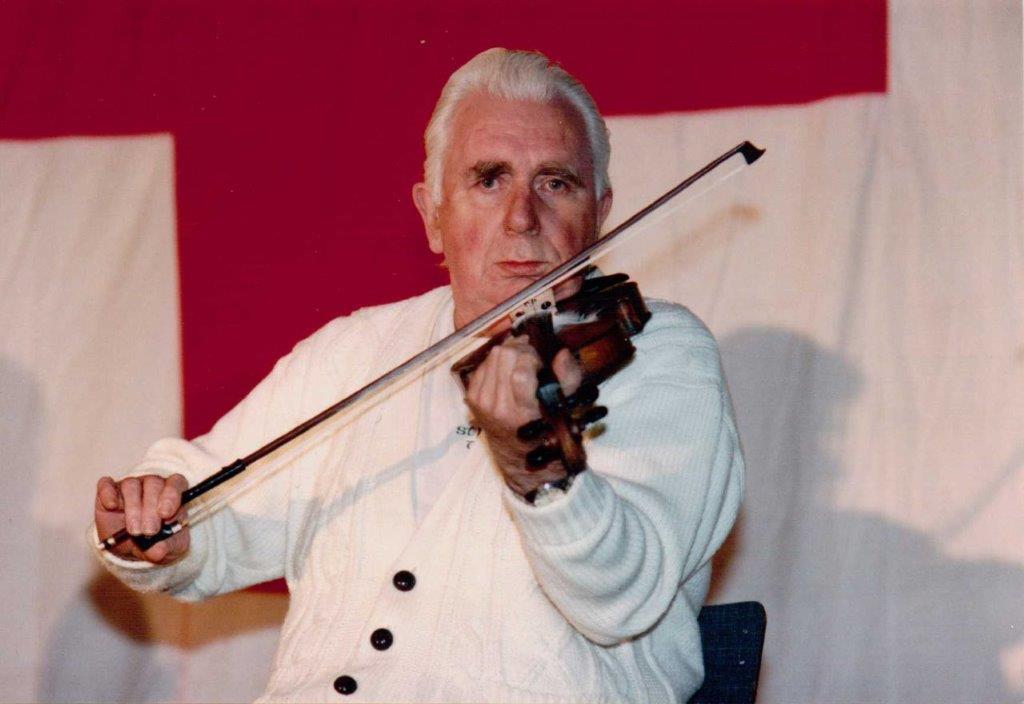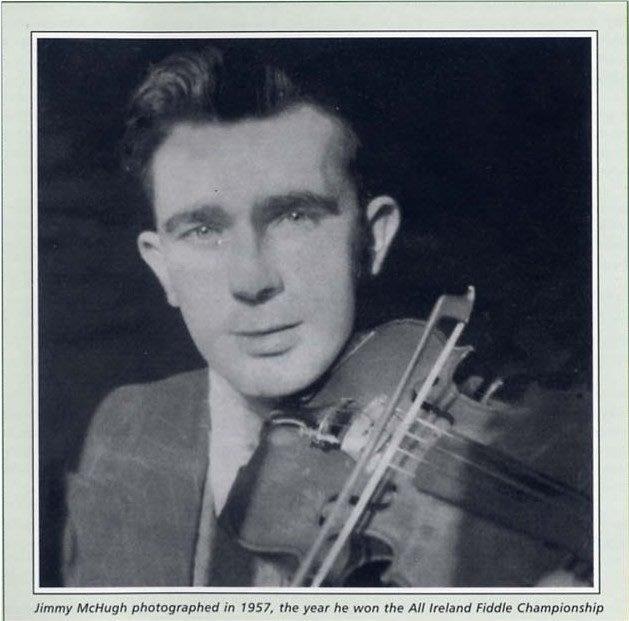Tyrone fiddler Jimmy McHugh is celebrated this weekend at the annual Glasgow festival in his honour
 Jimmy McHugh
Jimmy McHughTHIS weekend coming sees the 25th Jimmy McHugh Weekend in Glasgow. The festival, which celebrates the great Tyrone fiddler, will open at Leonardo’s Hotel Glasgow this Friday, January 12, and continue at various venues throughout the weekend, on January 13-14.
Musicians from across Britain and Ireland will journey to Glasgow to celebrate the life, carer and influence of Jimmy McHugh.
Born in Omagh, Co. Tyrone in 1930, Jimmy grew up in Glenfinn, Co. Donegal where he learned to play the fiddle as a young lad. He is recognised as one of the finest players of his generation, winning the All Ireland Fiddle Championship 1957. He is also seen as one of the musicians who was pivotal in instigating the traditional Irish pub session, or 'seisún', in Glasgow, among the first in the world.
Jimmy McHugh had a strong ‘northern’ style, fashioned by Donegal traditional music — with plenty of attack and Scottish snap, plenty of droning strings and double stops. But he also had a more legato style, exemplified in the Sligo style, which he could easily switch to, thanks to his complete mastery of bow technique.
Jimmy’s Sligo influence came from being largely self-taught and learning so many tunes from 78 rpm records by his heroes, the Sligo masters Michael Coleman, James Morrison and Paddy Kiloran.
In Donegal, as throughout the Celtic world, there is a large body of folklore associated with the fiddle. It was often regarded as an enchanted instrument - according to legend the music already existed inside the body of the fiddle and it was the craft of the fiddler to tease the music out. Jimmy McHugh could do that with ease.
Until his untimely death in January 1999, Jimmy continued to lead by example, regularly playing at céilís, feisanna, fleadhs as well as his Monday night sessions in Glasgow's Sharkey's Bar which continue as ‘Jimmy's Session’, to this day.
Jimmy McHugh emigrated to Scotland with other members of his family in 1946, aged 16. Initially staying with an aunt, he got his first job as a coalman then worked on building sites, becoming a machine driver. Never a full-time musician, he nonetheless spent every spare minute of his time playing the fiddle.
He joined Four Provinces Céilí Band, which was already established. It consisted mainly of players from Tyrone, Fermanagh and Donegal, and Jimmy soon became a mainstay of the band.
As the McHugh household became a magnet for musicians, visitors during the 1960s might include his friend and renowned fellow fiddler Sean Maguire from Belfast, accordionist Joe Burke or Donegal fiddler Danny O’Donnell.
Jimmy also mixed with many Scottish musicians such as the great Mull accordionist Bobby MacLeod, who would stay with the McHughs, complete with band, if they were in Glasgow.
Occasionally touring with Bobby McLeod (a rare Irish musician playing in a Scottish dance band), Jimmy met up with the other leading Scottish band musicians and performers such as Jimmy Shand and Ian Powrie, as well as the Alexander Brothers and the award-winning singer Calum Kennedy.
In the late 1950s, a time ‘traditional seisún’ had not really coalesced and inded music could be frowned on in pubs, Jimmy persuaded the proprietor of the Camden Bar in Crown Street to let him and his band practise. This was one of the first pub sessions in Scotland, mirrored by the pub sessions that were now beginning to take place in England.

Jimmy made many broadcasts for BBC and STV as well as RTÉ. His son, Brendan, recalls a particularly memorable gathering at one of the early Kinross festivals, his father playing with Shetland’s Willie Hunter and Peerie Willie Johnson, and Sean Maguire, among others.
Jimmy was also a prolific composer, with more than 40 tunes to his credit, many of which have since become established among players. He was also a committed teacher, tireless and generous with his time. “If someone was struggling with a tune he would encourage them for hours until they succeeded,” says Brendan. “He would stop in the middle of a session and show someone a tune if they wished. People would turn up at the house, day or night and he would always be there for a lesson, a tune or a session.”
He played for his wife’s school of Irish dancing at festivals, and also played Gaelic football with the Paisley Gaels.
His influence in promoting Irish music spread further when in 1957 – the same year that he won the All-Ireland Fiddle Championship – he co-founded, with Owen Kelly the Glasgow Branch of Comhaltas Ceoltóirí Éireann, the organisation which had been established in Ireland a few years before to promote Irish music. Jimmy had heard about the new organisation while visiting the Fleadh in Ennis the previous year, and the branch he and Owen established in Glasgow was the first outside Ireland.
Jimmy was still playing in sessions until a week of his death. His wife Ann continues as an Irish dancing teacher and adjudicator, while his son Brendan carries on the tradition. Sadly, Martin — his other son who played in the Four Provinces Céilí Band — died in 2017.
For details of the festival or enquiries about accommodation call Brendan on 07855 292062


